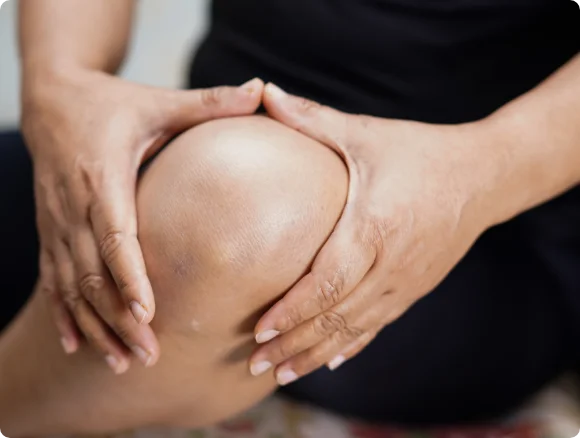Total Knee Replacement
Experience Relief. Regain Mobility.
Living with chronic knee pain can feel like an uphill battle, impacting every aspect of your life - from simply walking up the stairs to enjoying your favourite hobbies. Conditions such as osteoarthritis, rheumatoid arthritis, or previous injuries or trauma can lead to persistent pain and stiffness, making movement increasingly difficult. If you find yourself in this situation, you might be considering total knee replacement (TKR) as a way to regain your mobility and enhance your quality of life. This guide aims to walk you through everything you need to know about total knee replacement surgery, from what to expect before and after surgery, and the benefits it can provide.

What is a Total Knee Replacement?
Total knee replacement, also known as knee arthroplasty, is a surgical procedure that involves replacing the damaged or worn parts of your knee joint with artificial components, known as a knee prosthesis. The aim of the surgery is straightforward but powerful: alleviate pain, restore function to the knee, regain your mobility, and help you get back to living life.
During the operation, the surgeon will remove the ends of the femur (thigh bone) and tibia (shin bone) along with any damaged cartilage. These will be replaced with prosthetic pieces made from durable materials such as metal, plastic, or ceramics. This new setup allows for smoother movement and dramatically reduces pain.

About Dr Blake Fidock
MBBS (Hons. 1), MTrauma (Ortho), FRACS (Ortho), FAOrthA
Orthopaedic Surgeon
What are the benefits of a Total Knee Replacement?
The potential benefits of knee replacement surgery are significant and can be life-changing for many patients. Some of these include:
What are the risks and complications of a Total Knee Replacement?
While total knee replacement is considered a safe and effective procedure, being aware of potential risks can help you prepare. Some risks to be aware of include:
What is involved in having a Total Knee Replacement?
Understanding the surgical process can help demystify what to expect, easing any anxiety you may have.
- Preoperative Preparation: Leading up to the surgery, Ortho ARC Brisbane will conduct a comprehensive evaluation that includes a physical exam, medical history review, and imaging studies like X-rays and CT scans. This preparation stage is crucial for discussing any medications you might need to stop or adjust, as well as to outline your recovery plan at home.
- The Surgery: The surgery itself usually takes about 1 to 2 hours. Most patients receive spinal anaesthesia, or a general anaesthetic, to ensure they’re comfortable throughout the procedure. Many patients are surprised at how quickly the procedure is done and are already on their way into the recovery phase of their journey.
- Recovery in the Hospital: After your surgery, you will typically spend a few days in the hospital to recover. Dr Blake Fidock and his team will monitor your progress, manage any pain, and begin your rehabilitation journey right away. Early mobility is encouraged, and getting up and moving—often with the help of physical therapists—will be part of your postoperative care.
What is involved in my Recovery and Rehabilitation?
The road to recovery is a crucial aspect of your journey to a new knee. Your commitment to following rehabilitation protocols can significantly impact your overall outcome and the longevity of your knee replacement.
- Physiotherapy: Right from the early stages post-surgery, physiotherapy plays an essential role in your recovery. A dedicated physiotherapist will work with you to implement a rehabilitation plan that focuses on restoring strength, mobility, and function in your newly replaced knee. You might start with gentle range-of-motion exercises, gradually progressing to more challenging movements as your strength improves. The goal is to strengthen the muscles around the knee and to help you regain normal walking patterns.
- Getting Home Sooner: Once you return home from the hospital, it’s vital to follow our guidelines and rehabilitation instructions. You’ll likely be given instructions about managing pain, caring for your incision site and dressing, and limitations on your activities. Using assistive devices like crutches or a walker can provide additional support as you navigate your home environment. As you progress, you'll be encouraged to engage in daily activities, but it's essential to listen to your body and pace yourself to avoid overexertion.
- Gradual Return to Activities: Most patients can start returning to light activities within 6 weeks after surgery, and many can resume most normal activities by about 3 to 6 months. However, achieving full recovery can take time. Patience is crucial; progression in physiotherapy and recovery varies from person to person. Avoid high-impact activities and ensure that any new exercise is cleared by your physiotherapist and Dr Blake Fidock.
Frequently Asked Questions (FAQs)
Final Comments
Total knee replacement can be a transformative experience, offering a new lease on life for those struggling with chronic knee pain. While the journey to recovery may require effort and dedication, the potential benefits—reduced pain, improved mobility, and enhanced quality of life—make it a worthwhile pursuit. By understanding the procedure, its advantages and risks, and the recovery process, you can approach your surgery with confidence and an optimistic mindset.
If you’re considering a total knee replacement, remember that you're not alone. Many have walked this path before you, and with the right support, you can look forward to a future filled with movement, joy, and a renewed ability to engage in what matters most to you.
Contact us today
Take the first steps in your journey to
Experiencing Relief, and Regaining Your Mobility.